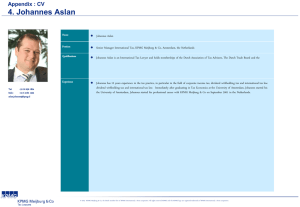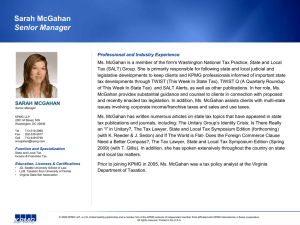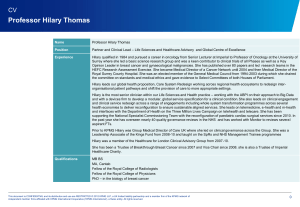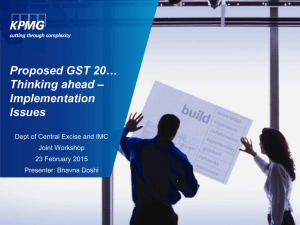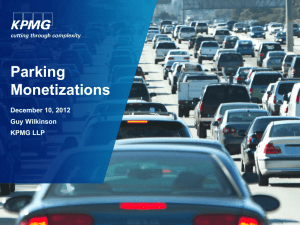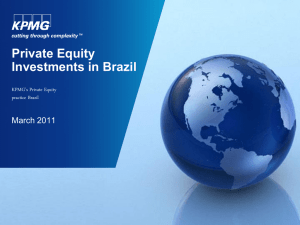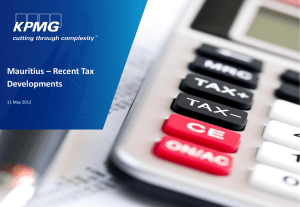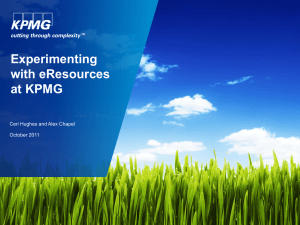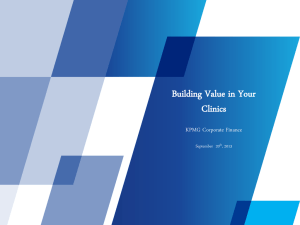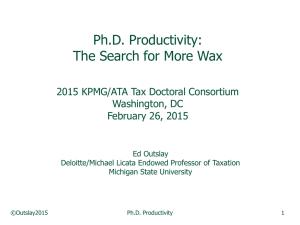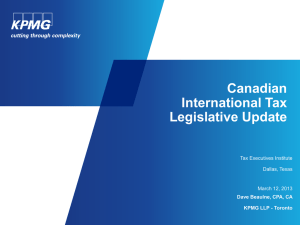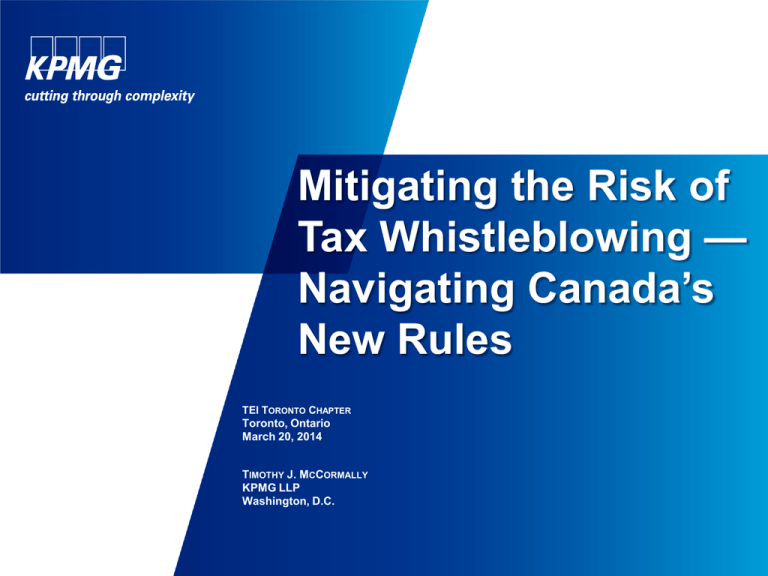
Mitigating the Risk of
Tax Whistleblowing —
Navigating Canada’s
New Rules
TEI TORONTO CHAPTER
Toronto, Ontario
March 20, 2014
TIMOTHY J. MCCORMALLY
KPMG LLP
Washington, D.C.
© 2014 KPMG LLP, a Delaware limited liability partnership and the U.S. member firm of the KPMG network of independent member fi rms affiliated with
KPMG International Cooperative (“KPMG International”), a Swiss entity. All rights reserved. Printed in the U.S.A.
Notice
ANY TAX ADVICE IN THIS COMMUNICATION IS NOT INTENDED OR
WRITTEN BY KPMG TO BE USED, AND CANNOT BE USED, BY A
CLIENT OR ANY OTHER PERSON OR ENTITY FOR THE PURPOSE
OF (i) AVOIDING PENALTIES THAT MAY BE IMPOSED ON ANY
TAXPAYER OR (ii) PROMOTING, MARKETING OR RECOMMENDING
TO ANOTHER PARTY ANY MATTERS ADDRESSED HEREIN.
You (and your employees, representatives, or agents) may disclose to any and all
persons, without limitation, the tax treatment or tax structure, or both, of any
transaction described in the associated materials we provide to you, including, but
not limited to, any tax opinions, memoranda, or other tax analyses contained in
those materials.
The information contained herein is of a general nature and based on authorities
that are subject to change. Applicability of the information to specific situations
should be determined through consultation with your tax adviser.
Copyright for the specific content remains with the firm whose representative
presents it.
© 2014 KPMG LLP, a Delaware limited liability partnership and the U.S. member firm of the KPMG network of independent member firms affiliated with
KPMG International Cooperative (“KPMG International”), a Swiss entity. All rights reserved. Printed in the U.S.A.
2
Objectives
Review developments relating to tax whistleblowing in
popular media
Review U.S. tax whistleblowing rules
Review Canada’s new Offshore Tax Informant Program
Review non-tax costs of whistleblowing
Consider steps to mitigate tax whistleblowing risk
© 2014 KPMG LLP, a Delaware limited liability partnership and the U.S. member firm of the KPMG network of independent member firms affiliated with
KPMG International Cooperative (“KPMG International”), a Swiss entity. All rights reserved. Printed in the U.S.A.
3
Agenda
Tax Whistleblowers in the News
U.S. Tax Whistleblower Rules
Canada’s Offshore Tax Informant Program
Mitigating Whistleblower Risk
Appendix: Information on BEPS and Tax Transparency
Questions
© 2014 KPMG LLP, a Delaware limited liability partnership and the U.S. member firm of the KPMG network of independent member firms affiliated with
KPMG International Cooperative (“KPMG International”), a Swiss entity. All rights reserved. Printed in the U.S.A.
4
Tax Whistleblowers in the News
Not Just the News, but the Headlines
Whistleblowers in the News: Not just national security,
but taxes.
Most prominent tax whistleblower is Bradley
Birkenfeld. He’s the former UBS employee who secured
a $104 million whistleblower award from the U.S.
government for telling the Internal Revenue Service
about his employer’s involvement in helping UBS
clients evade their U.S. tax obligations.
© 2014 KPMG LLP, a Delaware limited liability partnership and the U.S. member firm of the KPMG network of independent member firms affiliated with
KPMG International Cooperative (“KPMG International”), a Swiss entity. All rights reserved. Printed in the U.S.A.
5
Tax Whistleblowers in the News
UBS Case Is Special, but not Unique
— Other Headlines
Tax Whistleblower Gets $2 Million IRS Award: Lawyer
(Chicago Tribune).
Tax Informants Are On The Loose (Forbes).
IRS Gives $4.5 Million Award to Tax Whistle-blower
(Associated Press).
First False Claims Act Recovery in New York,
Whistleblower Awarded $1.1 Million (Corporate Crime
Reporter).
© 2014 KPMG LLP, a Delaware limited liability partnership and the U.S. member firm of the KPMG network of independent member firms affiliated with
KPMG International Cooperative (“KPMG International”), a Swiss entity. All rights reserved. Printed in the U.S.A.
6
Tax Whistleblowers in the News
Letting the Facts Get in the Way . . .
•
In 2013, Google officials were called before a U.K.
parliamentary committee after Thomson Reuters
published stories undermining the company’s claims
about having no permanent establishment in the
country. Tipped off by a whistleblower, TR reporters
researched LinkedIn profiles of Google employees.
• U.K. tax authorities defended its scrutiny of Google’s
activities, but the whistleblower’s tips led to days of
headlines such as “UK lawmakers challenge Google’s
‘smoke and mirrors’ on tax.”
© 2014 KPMG LLP, a Delaware limited liability partnership and the U.S. member firm of the KPMG network of independent member firms affiliated with
KPMG International Cooperative (“KPMG International”), a Swiss entity. All rights reserved. Printed in the U.S.A.
7
U.S. Whistleblower Rules
Internal Revenue Code § 7623
Awards for provision of information relating to a
violation of the internal revenue law.
When amounts exceed $2 million, statutory award is
between 15% and 30% of amount collected (reduced to
10% when information is publicly available).
IRS has discretionary authority to grant awards for
cases less than $2 million.
Notice 2008-4: Guidance on filing claims.
Regulations issued in December 2012.
© 2014 KPMG LLP, a Delaware limited liability partnership and the U.S. member firm of the KPMG network of independent member firms affiliated with
KPMG International Cooperative (“KPMG International”), a Swiss entity. All rights reserved. Printed in the U.S.A.
8
U.S. Whistleblower Rules
Awards, Even for Those Who Participated
in Tax Evasion Scheme
The Whistleblower Office may reduce an award if informant
“planned and initiated” actions leading to the underpayment.
I.R.C. § 7623(d)(3).
Where informant is convicted of criminal conduct related to
underpayment, no award may be given at all.
In September 2012, IRS announced $104 million award to
Bradley Birkenfeld for information leading to $5 billion
settlement between IRS and UBS Bank. (Mr. Birkenfeld served
prison sentence for assisting certain individuals in hiding
foreign bank accounts from IRS.)
© 2014 KPMG LLP, a Delaware limited liability partnership and the U.S. member firm of the KPMG network of independent member firms affiliated with
KPMG International Cooperative (“KPMG International”), a Swiss entity. All rights reserved. Printed in the U.S.A.
9
U.S. Whistleblower Rules
Awards, Even for Those Who Participated in Tax
Evasion Scheme
In October 2012, IRS awarded another whistleblower $38
million.
Since enactment of 2006 amendments, there have been more
than 1,900 tax whistleblowers, involving 10,500 taxpayers.
Treasury Department’s Inspector General for Tax
Administration reported that tips received in 2008 added up to
$65 billion in unreported income.
For six years ending September 30, 2013, IRS paid out
approximately $230 million in whistleblower awards, including
about $50 million in FY2013.
© 2014 KPMG LLP, a Delaware limited liability partnership and the U.S. member firm of the KPMG network of independent member firms affiliated with
KPMG International Cooperative (“KPMG International”), a Swiss entity. All rights reserved. Printed in the U.S.A.
10
U.S. Whistleblower Rules
Recent Examples Involving Large Companies
In-house tax professional indicted for participating in filing of false tax return after
colleague raised internal concerns about research tax credit claim. The company, a
government contractor, conducted internal investigation and subsequently
referred matter to Justice Department. After jury trial, tax professional was
acquitted of criminal charges under I.R.C. § 7206(2).
Tax department employee filed federal job-protection suit under SOX claiming he
was reassigned (and denied certain compensation) after raising concerns
internally about certain international transactions. Suit, which alleged “unlawful
scheme to avoid over $2 billion in federal income tax,” was settled without any
adjudication of underlying tax claims.
Tax department employee filed wrongful discharge suit under SOX and RICO
alleging company misled IRS and hid tax shelter from outside auditor. (Tax at issue
alleged to be $7 million.) Case dismissed and, in separate state case by the
company, employee was found liable for defamation. (Separate internal
investigation upheld company’s tax position.)
© 2014 KPMG LLP, a Delaware limited liability partnership and the U.S. member firm of the KPMG network of independent member firms affiliated with
KPMG International Cooperative (“KPMG International”), a Swiss entity. All rights reserved. Printed in the U.S.A.
11
Canada Gets Into the Act
Harper Government Announces
Tax Whistleblowing Program
Announced in March 2013 as part of the Government’s
Budget, the Offshore Tax Informant Program is part of
a larger Canada Revenue Agency program aimed at
ending international tax evasion.
CRA is working out the details, but in January 2014
published a broad outline of the program on its
website.
© 2014 KPMG LLP, a Delaware limited liability partnership and the U.S. member firm of the KPMG network of independent member firms affiliated with
KPMG International Cooperative (“KPMG International”), a Swiss entity. All rights reserved. Printed in the U.S.A.
12
Canada’s Offshore Tax Informant Program
Eligibility Requirements
The program contemplates CRA’s entering into a
contract with the informant.
The informant cannot be convicted of the tax evasion
about which he or she reveals information and still
receive award.
The information must lead to an assessment or
reassessment exceeding $100,000 in federal taxes.
Payment will be made after the tax debt has been
collected and all recourse rights associated with the
assessed tax have expired.
© 2014 KPMG LLP, a Delaware limited liability partnership and the U.S. member firm of the KPMG network of independent member firms affiliated with
KPMG International Cooperative (“KPMG International”), a Swiss entity. All rights reserved. Printed in the U.S.A.
13
Canada’s Offshore Tax Informant Program
Eligibility Requirements
The award will be between 5% and 15% of federal taxes
(i.e., not including penalties, interest, and provincial
taxes).
The non-compliant activity must involve foreign
property or property located or transferred outside
Canada or transactions conducted partially or entirely
outside Canada.
Payment will not be made to an individual who has
been convicted of tax evasion related to the
information provided.
© 2014 KPMG LLP, a Delaware limited liability partnership and the U.S. member firm of the KPMG network of independent member firms affiliated with
KPMG International Cooperative (“KPMG International”), a Swiss entity. All rights reserved. Printed in the U.S.A.
14
Canada’s Offshore Tax Informant Program
Eligibility Requirements
Unlike the current Informant Leads Program (ILP)
(which does not pay awards), the new program will not
accept anonymous submissions, although the identity
of the informant will not be disclosed.
o So-called Liechtenstein audits were prompted by
informant tips.
CRA currently receives approximately 24,000 referrals
annually under the ILP.
© 2014 KPMG LLP, a Delaware limited liability partnership and the U.S. member firm of the KPMG network of independent member firms affiliated with
KPMG International Cooperative (“KPMG International”), a Swiss entity. All rights reserved. Printed in the U.S.A.
15
Canada’s Offshore Tax Informant Program
Differences between U.S. and Canadian Rules
In the United States, whistleblower awards range
between 15% and 30% of the amounts collected,
whereas in Canada, the award is only between 5% and
15%.
In the United States, an award is only available where
the “collected proceeds” exceeds $2 million, whereas
in Canada, the threshold is $100,000.
© 2014 KPMG LLP, a Delaware limited liability partnership and the U.S. member firm of the KPMG network of independent member firms affiliated with
KPMG International Cooperative (“KPMG International”), a Swiss entity. All rights reserved. Printed in the U.S.A.
16
Canada’s Offshore Tax Informant Program
Differences between U.S. and Canadian Rules
In the United States, the award will be based on the
total amount collected by the IRS (i.e., including
interest and penalties), whereas in Canada, it will be
based only on the amount of tax recovered.
In the United States, the program is statutory, whereas
in Canada, it is administrative and contractual.
© 2014 KPMG LLP, a Delaware limited liability partnership and the U.S. member firm of the KPMG network of independent member firms affiliated with
KPMG International Cooperative (“KPMG International”), a Swiss entity. All rights reserved. Printed in the U.S.A.
17
Canada’s Offshore Tax Informant Program
Policy Questions
OTIP is aimed not only at tax evasion but at efforts by
“high-income taxpayers who attempt to evade or avoid
tax using complex international legal arrangements,”
without acknowledging tax avoidance is legal.
OTIP is not alone in conflating tax evasion and
aggressive tax avoidance. Daily media reports —
augmented by government hearings and hyperbole —
feed a growing perception that tax avoidance is
depriving costing governments of significant revenue
at a time of high deficits and debt levels.
© 2014 KPMG LLP, a Delaware limited liability partnership and the U.S. member firm of the KPMG network of independent member firms affiliated with
KPMG International Cooperative (“KPMG International”), a Swiss entity. All rights reserved. Printed in the U.S.A.
18
Canada’s Offshore Tax Informant Program
Policy Questions
CRA has tools to pursue and prosecute tax evaders,
especially given trends in tax transparency and more
exchanges of information by tax authorities, including
those spurred by the OECD’s BEPS project.
o Auditor General’s Fall 2013 report reviews Liechtenstein
audits and other efforts to address undeclared offshore
income (including volunteer disclosure agreements).
o 43 Liechtenstein audits led to 23 reassessments,
generating $24.651 million in federal tax, interest, and
penalties.
© 2014 KPMG LLP, a Delaware limited liability partnership and the U.S. member firm of the KPMG network of independent member firms affiliated with
KPMG International Cooperative (“KPMG International”), a Swiss entity. All rights reserved. Printed in the U.S.A.
19
Canada’s Offshore Tax Informant Program
Policy Questions
CRA has tools … (continued)
o Foreign Income Verification Statement (Form T1135).
o Information exchange with Australia, U.K., and U.S
governments.
Tips from whistleblowers can prove a distraction,
diverting attention from areas that can better use
CRA’s limited resources.
© 2014 KPMG LLP, a Delaware limited liability partnership and the U.S. member firm of the KPMG network of independent member firms affiliated with
KPMG International Cooperative (“KPMG International”), a Swiss entity. All rights reserved. Printed in the U.S.A.
20
Mitigating Whistleblower Risk
Non-Tax Costs Can Be Substantial
Even assuming whistleblower’s claims do not lead to additional tax
liability or penalty, costs to company could be substantial:
Financial:
o Legal and other fees incurred in responding to merits of tax
claims.
o Legal costs and possible monetary damages if retaliation (or
unlawful discharge) is alleged, either under general employment
law principles, Sarbanes-Oxley Act (SOX), or Racketeer
Influenced and Corrupt Organization Act (RICO).
o Consulting fees paid to crisis management, government affairs,
or public relations firms relating to claim.
© 2014 KPMG LLP, a Delaware limited liability partnership and the U.S. member firm of the KPMG network of independent member firms affiliated with
KPMG International Cooperative (“KPMG International”), a Swiss entity. All rights reserved. Printed in the U.S.A.
21
Mitigating Whistleblower Risk
Non-Tax Costs Can Be Substantial
(continued)
Human Resources:
o Decline in employee productivity and morale, both within
and outside tax department.
Reputational:
o If whistleblower’s claim becomes public — for example,
by leak to media or suit for unlawful retaliation —
company could find its name in headlines. Even if claim
does not become public, company’s credibility with IRS,
CRA, or other governmental bodies could be impaired.
© 2014 KPMG LLP, a Delaware limited liability partnership and the U.S. member firm of the KPMG network of independent member firms affiliated with
KPMG International Cooperative (“KPMG International”), a Swiss entity. All rights reserved. Printed in the U.S.A.
22
Mitigating Whistleblower Risk
Don’t Make Matters Worse — Avoid Actual or Perceived
Retaliation.
Confirm Adequacy of Company’s Ethics Hotline and Tax
Department Awareness of Procedures.
Review and Revise Tax Department Procedures and Practices.
o Demystify Tax.
o Set Proper Tone at the Top; Listen to Your Team.
o Train Your Team.
o Review Performance Standards.
o Review the Company’s Policy for Making Disclosures to IRS and
CRA.
See Michael P. Dolan & Timothy J. McCormally, Which Way the
Wind Blows: Mitigating Whistleblower Risk, 139 Tax Notes 1537
(June 24, 2013).
© 2014 KPMG LLP, a Delaware limited liability partnership and the U.S. member firm of the KPMG network of independent member firms affiliated with
KPMG International Cooperative (“KPMG International”), a Swiss entity. All rights reserved. Printed in the U.S.A.
23
Appendix – Information on BEPS and Tax
Transparency
http://www.kpmginstitutes.com/taxwatch/insights/2013/tax-transparency.aspx
© 2014 KPMG LLP, a Delaware limited liability partnership and the U.S. member firm of the KPMG network of independent member firms affiliated with
KPMG International Cooperative (“KPMG International”), a Swiss entity. All rights reserved. Printed in the U.S.A.
Appendix – Information on BEPS and Tax
Transparency
http://www.kpmg.com/US/en/IssuesAndInsights/ArticlesPublications/taxnewsflash/Pages/beps-taxnewsflash.aspx
© 2014 KPMG LLP, a Delaware limited liability partnership and the U.S. member firm of the KPMG network of independent member firms affiliated with
KPMG International Cooperative (“KPMG International”), a Swiss entity. All rights reserved. Printed in the U.S.A.
Speaker Biography
Timothy J. McCormally is a Director in the Washington National Tax practice of
KPMG LLP. He served as Executive Director of Tax Executives Institute from
2002 to 2013, and as the organization’s top lawyer for the previous 19 years. Mr.
McCormally received his B.A. degree from the University of Iowa and his J.D.
degree from Georgetown University Law Center. Throughout his 30-year tenure
at TEI, he was editor of The Tax Executive. He has contributed to that magazine,
Tax Notes, Tax Adviser, and other tax periodicals, and has spoken at programs
sponsored by TEI and other organizations, including NYU’s State and Local Tax
Institute. He lectures extensively on tax ethics and is co-author of a recent article
for Tax Notes on best practices to mitigate the risk of tax whistleblowing. His
article entitled “The Language of Tax: Cautionary Notes for the Tax Reform
Debate,” was published in the March 10, 2014, issue of Tax Notes. Timothy
serves as a Fellow of the American College of Tax Counsel, and is a recipient of
TEI’s Honorary Membership Award as well as the First Annual Tax Policy Award
of Quinnipiac University. For three years in a row while at TEI, Timothy was
named one of the top ten most influential people in the sphere of global taxation
for three years in a row by the U.K. publication Tax Business. In 2014, Mr.
McCormally was appointed to the Internal Revenue Service Advisory Council.
© 2014 KPMG LLP, a Delaware limited liability partnership and the U.S. member firm of the KPMG network of independent member firms affiliated with
KPMG International Cooperative (“KPMG International”), a Swiss entity. All rights reserved. Printed in the U.S.A.
26
Thank you!
Timothy J. McCormally
KPMG LLP
tmccormally@kpmg.com
1.202.533.3079
27

